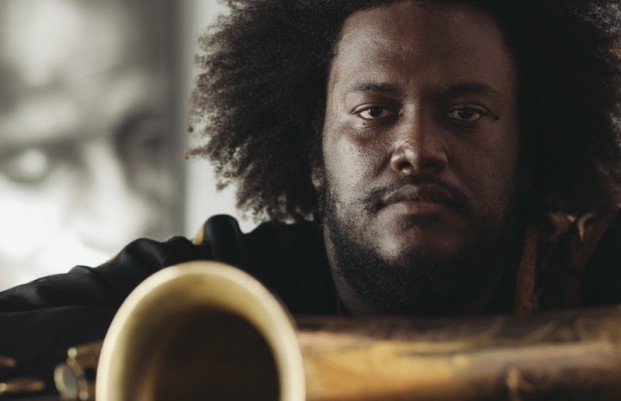In a sense, Los Angeles-based jazz saxophonist Kamasi Washington had it all. At just 19, he began touring with Snoop Dogg, which led to gigs backing up greats like the “Queen of Funk” Chaka Khan and jazz fusion bassist Stanley Clarke. More recently, his resume landed him a credit on Kendrick Lamar’s latest LP, To Pimp a Butterfly.
As a virtuoso, he could have easily carved out a career of steady work as a session player and hired gun on the road. But Washington and his friends, a loose collection of musicians known as the West Coast Get Down, knew they didn’t want to settle for in-demand support gigs, as their fathers had. They wanted the world to hear what they had to say.
And so Washington came out swinging. His debut full-length is a sprawling, no-holds-barred, three-disc opus, fittingly titled The Epic. With it, Washington has announced himself as one of the most talented and visionary figures on the burgeoning Los Angeles jazz scene.
This weekend, local audiences will have two opportunities to see Washington. He is scheduled to open San Jose Jazz Summer Fest’s Kaiser Permanente Main Stage at noon on Sunday with his band, The Next Step. Sunday night, he’ll close the California Theatre Stage with the West Coast Get Down collective.
To understand The Epic, it’s important to grasp Kamasi Washington’s musical past. As a teen in South Central Los Angeles, he formed the Young Jazz Giants with pianist Cameron Graves, drummer Ronald Bruner and Ronald’s brother, Stephen—better known as the Kendrick Lamar collaborator and producer, Thundercat—on bass.
“We were really focused,” Washington says, reflecting on that period. “We knew what we wanted to do in life. We were playing all day long, all night, going to jam sessions, sneaking into concerts, driving all over the city.”
Washington and his crew formed a “creative core” and found support in the greater L.A. area. The trick was pushing their ideas beyond the region.
The decades-long struggle among L.A.’s jazz community to step out from under the shadow of the New York scene may help explain the powerful tension that exists on Washington’s nearly three-hour outing, with its domineering, maximalist approach.
The album features hard-driving solos and a double rhythm section, composed of two drummers, two bassists and two keyboard players. String orchestra and choir arrangements float in and out of the mix, adding musical density to the already massive sound.
Ten seconds into the opening track, “Change of the Guard,” Kamasi and company live up to the album’s lofty title, unleashing a wall of sound that pushes the record to its limit. Eight minutes in, Washington’s tenor sax screams while pianos stab out sharp chords; the supporting strings slather on a layer of unruly tension that doesn’t let up over the track’s 12-minutes.
“Re Run Home,” the 14-minute opus that opens Epic’s third disc, simmers with urgency from start to finish, firmly grounded by the dual drum work of Ronald Bruner Jr. and Tony Austin. Ryan Porter and Igmar Thomas trade trombone and trumpet licks until their solos weave into one another, creating a musical synergy at once competitive and supportive. This open interplay is a hallmark of the album, and a testament not only to Washington but the world-class talent surrounding him on this project.
The Epic wasn’t created in a vacuum. It’s the latest work in a continuation of the sound Washington and his friends have collectively been creating for years—all with the steadfast support of Brainfeeder boss Steven Ellison, better known as Flying Lotus. The L.A.-based producer and leading voice in L.A.’s wide-open, forward-thinking, jazz-inflected music scene gave Washington the space and support to create whatever he wanted. For this, Washington is grateful.
“So often, the music has to struggle with the business,” Washington says. “It’s really cool when the business is just down and cool to let you do what you want to do.”
As Washington tells it, his father’s development was halted by the “pitfall of not believing in yourself enough to push your own music.” Washington doesn’t suffer from the same self-doubt about his musical ability. The way he sees it, the only real challenge is the clock. Washington is racing to get all his creativity out while he still can.
“In the end, time will run out,” Washington says. “There’s a time limit to how long you’ll have this gift at the highest level that you have it.” And so he will continue to play—as if his life depends on it.
Kamasi Washington plays San Jose Jazz Summer Fest on Aug. 9 at 12pm on the Kaiser Main Stage and at 7pm at the California Theatre Stage.



